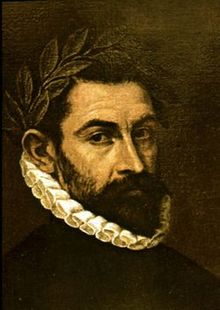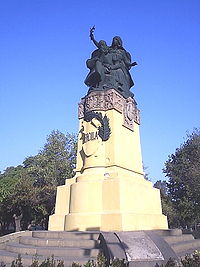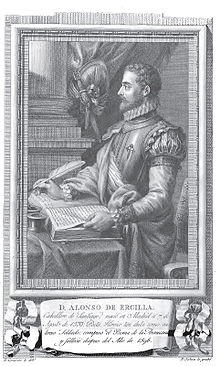- Alonso de Ercilla
-
"Ercilla" redirects here. For other uses, see Ercilla (disambiguation).
Don
Alonso de Ercilla
Caballero de Santiago
Born August 7, 1533
Madrid, SpainDied November 29, 1594 (aged 61)
Madrid, SpainAlonso de Ercilla y Zúñiga (August 7, 1533 – November 29, 1594) was a Spanish nobleman, soldier and epic poet from the Basque Country. While in Chile (1556–63) he fought against the Araucanians, and there he began the epic poem La Araucana, considered the greatest Spanish historical poem. This heroic work in 37 cantos is divided into three parts, published in 1569, 1578, and 1589. It tells of the courageous insurrection of the Araucanians and also relates the history of Chile and of contemporary Spain.
Contents
Biography
Ercilla was born into a spanish noble family. His father was Fortuño García de Ercilla, and his mother Doña Leonor de Zúñiga. In 1548, after his father's death, his mother became lady-in-waiting to the Infanta María and made young Alonso a page to the heir-apparent, Prince Philip (afterwards King Philip II). Ercilla received a very thorough education, for, besides having the most learned teachers, he enjoyed the advantages of very extensive travelling and of living at court where he came in contact with high personages. When he was only fifteen he accompanied Philip through Italy and Germany; and their travels lasted three years. Later, Ercilla accompanied his mother to Bohemia where he left her and then visited Austria, Hungary, and other countries. Returning to Spain, he soon started out again with Philip. In this capacity Ercilla (sometimes spelled Arcilla) visited Italy, Germany and the Netherlands, and was present in 1554 at the marriage of his master to Queen Mary I of England.
In London he made the acquaintance of Jerónimo de Alderete (1555), whose stories of his thrilling adventures in the New World so fired Ercilla's imagination that he determined to accompany Alderete to the New World. He therefore obtained leave from Philip, and they set sail for America, 15 October 1555. Soon after their arrival, however, Alderete died (near Panamá, April, 1556). Ercilla continued on his way to Peru, and in 1557 hearing that an expedition was preparing to subdue the Araucanians of Chile, he joined the forces of García Hurtado de Mendoza, who had recently been appointed Governor of Chile.
He distinguished himself in the ensuing campaign; but, having quarrelled with a comrade, he was condemned to death in 1558 by his general, García Hurtado de Mendoza. The sentence was commuted to imprisonment, but Ercilla was speedily released and fought at the Battle of Quipeo (December 14, 1558).
In 1556 Ercilla arrived in Peru and accompanied Don García Hurtado de Mendoza, recently named Governor and Commander-in-chief of Chile, where the Araucanos had revolted. Apparently he remained in Chile seventeen months, between 1557 and 1559. He participated in the battles of Lagunillas, Quiapo and Millarapue, and witnessed the death of Caupolicán, protagonist of La Araucana. This is an epic poem of military exaltation in 37 cantos, where the narrator relays the most significant facts of the Arauco War against the Araucanos (mapuches) and which he began to write during the campaign.
In March 1558 Don García founded the city of San Mateo de Osorno and while their neighbours were preoccupied with the celebrations in the new city Don García left by a secret entrance, disguised by a helmet with closed visor, accompanied by Alonso de Ercilla and Pedro of Eyrie. They were confronted by Juan de Pineda, an old enemy of Alonso de Ercilla, and there was a fight. Don García was warned of the situation.
Alonso de Ercilla ran to a church and looked for asylum. The governor imprisoned both duellists and condemned them to be executed on the following day. However, many people considered the sentence unjust and tried to persuade Don García Hurtado de Mendoza to reprieve them. The preparations for the execution continued and all hope of saving them was lost. Then two women, one Spanish and another Native American, approached the house of Don García, entering by the window, and managed to convince the governor to spare the lives of both. Alonso de Ercilla was imprisoned for three months and soon afterwards was exiled to Peru.
Later life
After Ercilla's return to Spain in 1562, he made several diplomatic journeys to Austria, where his mother was a maid of honor at the imperial court, and also visited Italy, France, Germany and Bohemia. In 1570, he married Doña María de Bazán, a woman of illustrious family and of intellectual attainments and, after other diplomatic missions, settled permanently in Spain in 1577. In 1571 he was made a knight of the Order of Santiago, and in 1578 he was employed by Philip II on a mission to Zaragoza. He complained of living in poverty but left a modest fortune, and was obviously disappointed at not being offered the post of secretary of state. Ercilla's later years were saddened by the loss of his only son, and his own death occurred in Madrid in 1594.
Works
Ercilla's great work is La Araucana, an epic poem of thirty-seven cantos, describing the difficulties encountered by the Spaniards during the insurrection in Arauco, and the heroic deeds of the natives as well as his companions. The epic partakes of the character of history, and the author adheres with such strict fidelity to the truth, that subsequent historians characterize his work as thoroughly trustworthy. In it the difficult art of story-telling is carried to perfection. Places are admirably described, dates are given with accuracy, and the customs of the native faithfully set forth, giving to the narrative animation and colouring.
The poem was published in three parts, of which the first, composed in Chile and first appearing in 1569, is a versified narrative adhering strictly to historic fact; the second, published in 1578, is encumbered with visions and other romantic machinery; and the third, which appeared in 1589-1590, contains, in addition to the subject proper, a variety of episodes mostly irrelevant. Withall, many scholars consider it the most successful Renaissance epic in the Classical mode written in Spanish. The best editions are those published by the Spanish Academy in 1776 and 1828.
In literature
In his novel In Search of the Castaways (1867), Jules Verne wrote,[1] "Araucania is populated by the Mapuche, the native Chilean race extolled in verse by the poet Ercilla".
Legacy
There is a municipality in the Araucania Region of Chile named after Ercilla.
See also
- Mapuche people
- Lautaro
- Caupolicán
- Colocolo
Sources
- ^ In Search of the Castaways, Chapter XI, "Traversing Chile".
 This article incorporates text from a publication now in the public domain: Chisholm, Hugh, ed (1911). Encyclopædia Britannica (11th ed.). Cambridge University Press.
This article incorporates text from a publication now in the public domain: Chisholm, Hugh, ed (1911). Encyclopædia Britannica (11th ed.). Cambridge University Press. "Alonso de Ercilla y Zúñiga". Catholic Encyclopedia. New York: Robert Appleton Company. 1913.
"Alonso de Ercilla y Zúñiga". Catholic Encyclopedia. New York: Robert Appleton Company. 1913.
 This article incorporates text from a publication now in the public domain: Herbermann, Charles, ed (1913). Catholic Encyclopedia. Robert Appleton Company.Categories:
This article incorporates text from a publication now in the public domain: Herbermann, Charles, ed (1913). Catholic Encyclopedia. Robert Appleton Company.Categories:- 1533 births
- 1594 deaths
- Basque people
- Spanish nobility
- Knights of Santiago
- Spanish writers
- Spanish explorers
- Colonial Chile
- 16th-century writers
- 16th-century Spanish people
- People of the Arauco War
Wikimedia Foundation. 2010.


